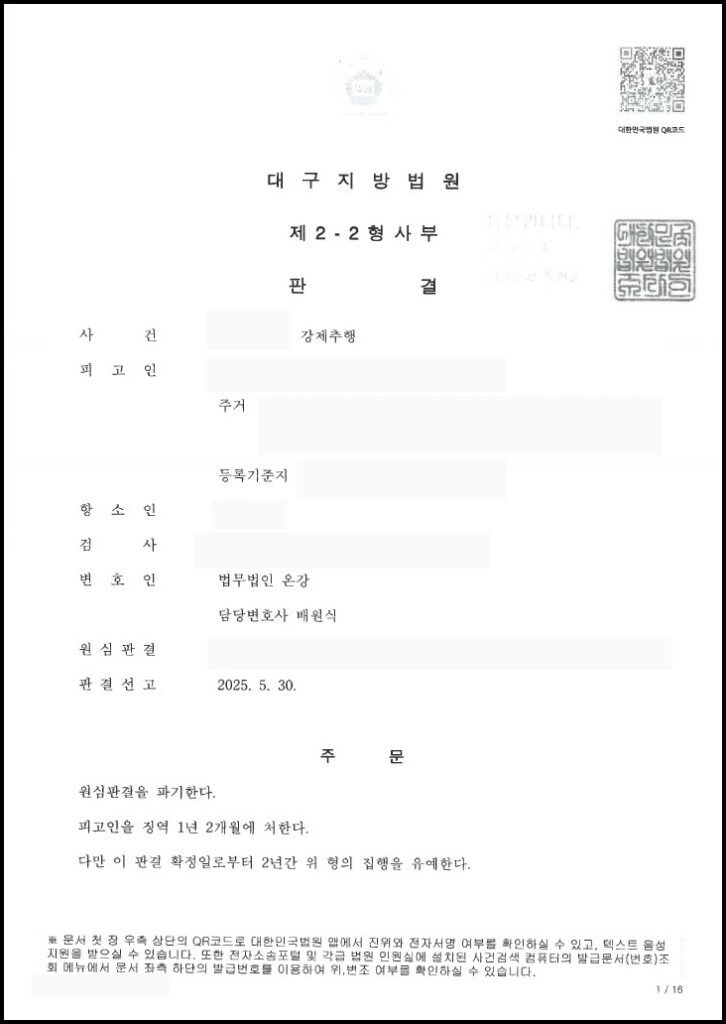Overview of the case (facts)
The client was charged with indecent assault in connection with a physical encounter that occurred with a stranger near a guesthouse.
The trial court found him guilty and sentenced him to imprisonment based solely on the victim's statement.
The client filed an appeal, complaining of injustice, and sought Ongang Law Firm to correct the injustice of the first trial court's decision.
Case Issues (Case Features)
This case involved a conviction based solely on the victim's testimony at trial, and the key issues on appeal were impeaching the credibility of the victim's testimony and challenging the realistic likelihood of the method of the crime described in the indictment.
Assistance from Ongang
Ong Kang's defense team actively challenged the factual errors and legal misunderstandings of the first-instance judgment at the appellate level, and focused on the following efforts to resolve the client's grievances.
1. highlighted the inconsistency and abstractness of the victim's statements: The defense argued that the victim's statements were unreliable, noting in detail that the specifics of the victim's statements during the investigation and the first trial were inconsistent, with details changed or added at different points in time, and that statements about the method of the crime or the process of resistance remained abstract, without specific descriptions that would be difficult to make without experience.
2. Impeachment of statements contrary to objective circumstances and prevailing wisdom: The victim's credibility was strongly impeached by logically explaining that the location of the crime was near a guesthouse where there was a risk of disclosure, that there were no physical injuries despite the victim's strong resistance, and that the victim's behavior immediately after the crime was inconsistent with prevailing wisdom and objective circumstances.
3. Submission of expert testimony analysis results: We commissioned a scientific analysis of the victim's testimony from a reputable testimony analysis expert and submitted the testimony analysis results as evidence, stating that the testimony was "insufficient to show that the declarant's testimony was based on actual experience," raising objective questions about the credibility of the victim's testimony.
4. Demonstrating the impracticality of the prosecution's case through a crime reenactment video: In order to verify whether the method of the crime described by the victim (restraining both arms with one hand while simultaneously molesting other body parts) was realistically possible, we arranged for a person with a similar physical condition to the client and the victim to reenact the crime. The video visually demonstrated the unreality of the prosecution's case by showing that it is physically difficult or impossible to effectively suppress the other person's resistance in the same way as the victim's statement, while simultaneously performing other acts, and that strong restraints are bound to leave bruises.
5. suggesting the victim's possible motive for innocence: Carefully suggesting that the victim may have a motive of innocence by carefully suggesting that the victim's behavior before and after the incident suggests that the victim may have had a crush on the defendant and felt rejected, and that resentment or anger may have led her to press charges.
6. emphasized the client's consistency and credibility: emphasized that the client had been telling the truth from the beginning of the investigation, consistently denying that he had been raped, but admitting that there had been physical contact. The client's statements were consistent with the circumstances of the incident, and the client's credibility was high.
■ Result
The Seoul High Court carefully reviewed the various evidentiary materials (statement analysis reports, crime reenactment videos, etc.) and arguments submitted by Ongang Law Firm in the appeal, and accepted the defense's arguments that there was reasonable doubt about the credibility of the victim's statement and that the method of crime described in the indictment was unlikely to occur in reality.
The Court of Appeals reversed the trial court's judgment, finding that the trial court committed an error of fact, and sentenced the client to a suspended prison sentence. This is a case where the client was successful in overturning the trial court's sentence of imprisonment and exercising his defense rights.
Case outcome materials




